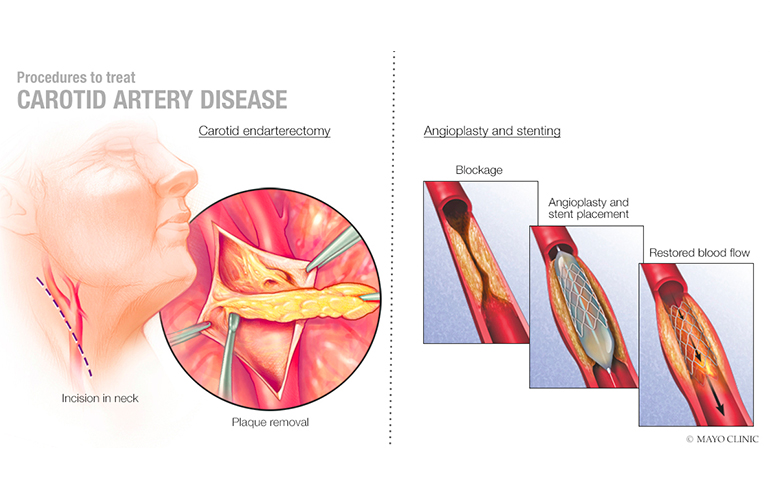CAROTID ARTERY DISEASE (CAD) – STROKE
Angiocare hospital at KPHB Coloney, Kukatpally, Hyderabad has treat patients with mainly carotid arteries diseases (CAD), Stroke usually occurs mainly due build up of plaques caused by hardening of the arteries when the main blood vessels that carry oxygen rich blood to heart and pumped to the brain develop blocks due to white fat, bad cholesterol, higher sugar levels, excess calcium circulation in blood and other substances may stimulate the endothelial cells to divide with fat build up around the connective tissues this leads to thickening or damage of the endothelium of inner lining and even of arteries and ultimately leading to shrinking of diameter and reduced blood flow, reduced oxygen supply simultaneously buildup of plaques this conditions is called atherosclerosis, or hardening of the arteries. When the buildup of clots or plaques becomes more severe, it usually leads to stroke.A major episode of stroke occurs when any part of the brain is damaged by the vascular problems; where part of the circulation to the brain is cut off, usually due to blockages in the carotid arteries.Atherosclerosis usually lead to serious problems like heart attack, brain stoke mostly leading to death if untreated early. If a plaque or clot blocks a blood vessel that nurtures the heart, it will eventually lead to heart attack. Plaques or clot blocks a blood vessel that nurtures the brain, it causes a stroke. Dr. Puneeth Joopalli is a specialized well trained with more success rate in performing surgery with patients suffering from atherosclerosis and stoke.

What Dr. Puneeth Joopalli suggests is males and people with a family history of premature cardiovascular disease have an increased risk of atherosclerosis. Other risk factors include:
High blood pressure, or hypertension, is a leading cause of stroke and the most significant controllable risk factor.
The nicotine and carbon monoxide in cigarette smoke damage the cardiovascular system and pave the way for a stroke. The use of birth control pills combined with cigarette smoking can greatly increase the risk of stroke.
If you have Type 1 or 2 diabetes, control your blood sugar. Diabetes mellitus is an independent risk factor for stroke. Many people with diabetes also have high blood pressure, high blood cholesterol and are overweight increasing their risk even more.
Diets high in saturated fat, trans fat and cholesterol can raise blood cholesterol levels. Diets high in sodium (salt) can increase blood pressure. Diets with high calories can lead to obesity.
Physical inactivity can increase your risk of stroke, heart disease, overweight/obesity, high blood pressure, high blood cholesterol and diabetes.
.
Large amounts of cholesterol in the blood can build up and cause blood clots leading to a stroke.
If one suspects the following signs and symptoms ; discuss and get diagnosis in Angiocare.
If one undergoes sudden weakness or numbness of the face, arm, or leg, usually on one side of the body
If one complains of sudden dimness or loss of vision, particularly in one eye
Uncontrolled loss of speech, or trouble talking or following or understanding speech
Persistent sudden severe headache with no apparent cause
Loss of head to body co-ordination with sudden episodes of difficulty walking or unexplained dizziness or unsteadiness. especially in combination with any of the previously noted symptoms.Sudden nausea or vomiting, fainting, confusion, seizures or coma are lees common symptoms of stroke.Stroke victims show different symptoms depending on the type of stroke, where exactly the stroke occurs in their brain, and how acute the bleeding is. Stroke symptoms happen suddenly and simultaneously, but not all symptoms may occur. Although strokes are usually sudden attacks, strokes can also occur over hours or several small stroke can occur over time. Symptoms then build in intensity as the stroke becomes more acute.Time saved is brain saved if small symptoms of stoke begins please call angiocare immediately. It usually takes a few seconds for the brain to stop functioning. The quicker a stoke victim treated, the less devastating the consequences will be.
